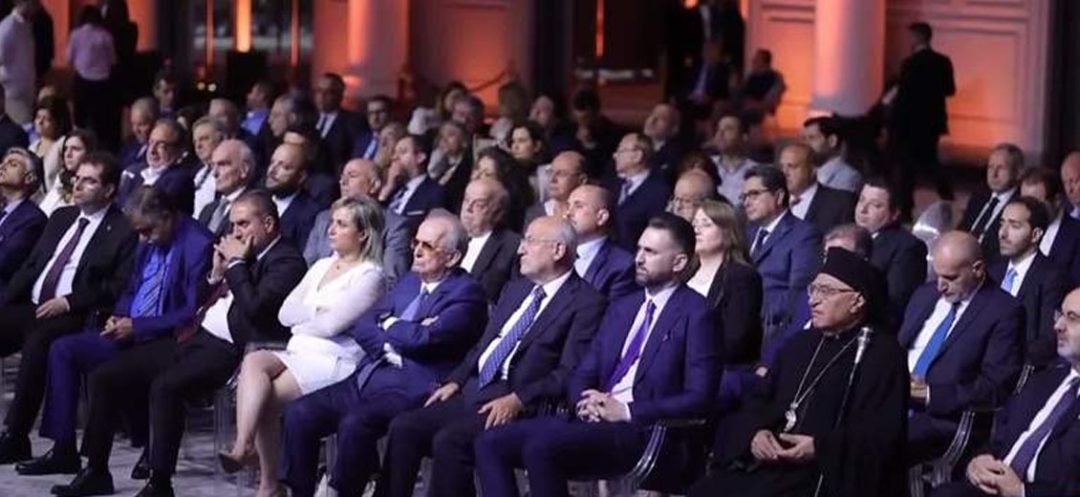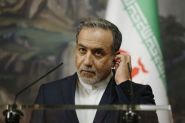
How can we reject fragmentation and adhere to the Constitution and the Taif Agreement? By having the will to elect a president and restore confidence in Lebanon. These were the topics discussed at the forum “Lebanon: from a scene of conflict to a nation in the making,” organized by the group Tajadod Lil Watan (Renewal for the Nation).
The forum was held on Saturday at the invitation of the president of Renewal for the Nation, Charles Arbid.
At the forum, guests were asked to give their opinion on Lebanon's place in the new regional order. They also discussed the challenge of making Lebanon more stable and attractive. The debates were preceded by speeches by the Patriarch of the Melkite Greek Catholic Church Youssef Absi, the Maronite Patriarch, Bechara Rai, and Charles Arbid.
The welcome address was given by our colleague Bassam Abou Zeid. Charles Arbid went on to say that this inclusive meeting shows that Lebanon is not short of meetings and declarations of good intentions, but rather of actions based on “conscious and pure wills”. Arbid defined Saturday's meeting as a “national event that transcends sectarianism and breaks from traditional alignments.”
“Lebanon is a homeland and not an arena, a space for interaction and growth and not a ground for conflict. We are trying to restore confidence in the State," he added.
Arbid insisted on restoring confidence in the country, starting with the election of a president and the formation of a competent government.
Confidence can also be built by resolving the Syrian migrant crisis without oppressing “either the displaced or Lebanon." He called for a rejection of fragmentation and a reaffirmation of Lebanon's adherence to the Constitution and the Taif Pact.
“We must insist on the establishment of a sovereign state that looks hopefully to the future, under a sound central authority,” he further declared. Arbid continued that coexistence in Lebanon must be safeguarded, and that the first loyalty must be to Lebanon. Lebanon must be neutral in conflicts in which it has no interest," he continued.
Patriarch of the Melkite Greek Catholic Church Youssef Absi hailed the Renewal for the Homeland as a new stage in a process that began two years ago. He recalled the bygone era, when religion was neither a barrier nor a reason for disagreement or separation.“The homeland is not the result of wishful thinking, but of will,” said Bishop Absi.
After having established a homeland, we slide towards the establishment of provinces or emirates," continued Absi, insisting on the difference between a confessional system and a confessional mentality.
“Confessionalism seeks the well-being of the nation and favors collective thought and action, while the confessional mentality seeks the security of personal interest and favors individual thought and action,” according to Archbishop Absi, who called for unity and reconciliation to be strengthened.
The Greek-Catholic patriarch recalled that his community believes in the homeland as a message, as announced by Pope John Paul II during his visit to Lebanon. “Our Church is one of encounter, not fanaticism,” he continued.
“The election of a President of the Republic is a step towards restoring confidence in Lebanon,” he concluded.
The Maronite patriarch, Bechara Rai, declared that the rupture between the Lebanese is the result of a lack of trust, preventing any initiative aimed at activating a sincere national dialogue.
“Is it not time for us to be true statesmen and immediately elect a president who will restore trust and put the country back on the right track?," hammered the Maronite patriarch.
Rai pointed out that the Lebanese people had chosen their representatives poorly in the past legislative elections. He also mentioned that the Lebanese society had become accustomed to problems and reticent about solutions, making crises easier to manage than solutions. “The fundamental elements that constitute a nation are those that currently divide the Lebanese,” he continued.
Rai recalled the ideas of Patriarch Howayek, who considered that belonging to Lebanon was a matter of citizenship, not religion. “The Patriarchate's position has always been firm: Lebanon is everyone's homeland. We have only one option, that of the homeland-state, and we must devote ourselves to it,” concluded Rai. The opening ceremony was followed by two panels.
The first, entitled “Lebanon in the new regional order”, was moderated by journalist Ghassan Hajjar, with the participation of MP Ali Fayyad and former ministers Ghazi Aridi and Ibrahim Najjar.
The second session, “Making Lebanon attractive and stable again," was moderated by our colleague Maurice Matta, with the participation of parliamentary vice-president Elias Bou Saab and former ministers Raya Al-Hassan and Daoud Sayegh.
The Renewal for Nation group, which organized the event, is the Greek-Catholic community's umbrella group.
They aim to propose public policies, solutions, and ideas for the governance of the country.
“This is the historical moderating role of the Greek Catholics," Charles Arbid, who is also President of the Lebanese Economic, Social and Environmental Council, told the Ici Eco program on Ici Beyrouth on Friday.
In attendance were the Greek-Catholic Patriarch, Youssef Absi, the Maronite Patriarch, Bechara Rai, caretaker Ministers Johnny Corm and Henry Khoury, Deputy Speaker of Parliament Elias Bou Saab, MPs: Ragy el-Saad, Teymour Joumblatt, Nadim Gemayel, Elias Hankach, Marwan Hamadeh, Akram Chehayeb, Hadi Abou el-Hosn, Faisal Sayegh, Bilal Abdallah, Alain Aoun, Nehmat Frem, Michel Moussa, Achraf Beydoun, former Minister Ghazi Aridi representing former Deputy and Minister Walid Joumblatt, the Mohafez of Beirut Marwan Abboud and several former ministers, ambassadors, and personalities from the world of religion, justice, and the security services.
Read more




Comments